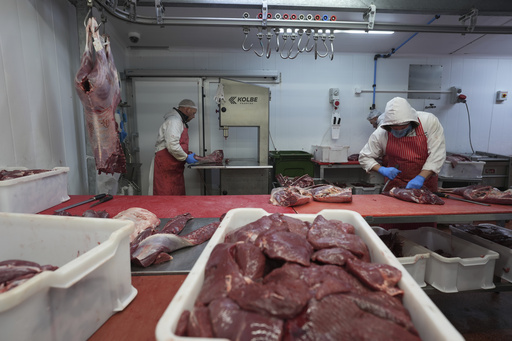
WINCHESTER, England — As twilight envelops the ancient woodlands, Martin Edwards patiently waits from his elevated position, peering through a thermal camera. Amid the serene atmosphere, the wildlife remains undisturbed until he takes his shot. The sharp report of his rifle shatters the calm, signaling the end for a buck among the throng of wild deer in Hampshire, southern England.
Edwards is a proponent of responsible deer management, which he believes is essential for controlling deer populations that threaten to overconsume local environments, a problem exacerbated by the absence of natural predators. For those advocating for humane culling, it transcends mere sport; it’s an urgent fulfillment of ecological necessity given the rapidly proliferating deer population across England.
Recent reports from the Forestry Commission illustrate that deer numbers have soared to unprecedented levels, surpassing any population counts over the past millennium. Environmental officials warn that this overabundance has dire consequences. With excessive foraging, deer are damaging vast stretches of woodlands and endangering the habitats of various bird species, including robins. Farmers face significant crop losses due to these invaders, and the overpopulation issue leads to increased rates of disease and starvation among the deer.
“Their reproductive rates have surged, and the consequences are being felt by farmers and foresters alike,” Edwards remarked, gesturing towards the young hazel plants ravaged by deer. “When populations spike, you can visibly witness the destruction of vegetation, stripped bare to a certain height.”
Experts in forestry and related industries argue that culling deer not only helps restore the ecological balance but also provides a sustainable source of protein, as the meat can be distributed to consumers. Venison, while often regarded as a high-end option in the U.K., is also viewed as an excellent protein alternative for those facing financial difficulties.
“Why not leverage this valuable resource to feed those in need?” asked SJ Hunt, the CEO of The Country Food Trust, which provides meals prepared with wild venison to food banks.
With an estimated 2 million deer currently inhabiting England’s forests, the government acknowledges the importance of native deer in maintaining healthy ecosystems but admits that population control is necessary. They have even allocated funds for initiatives like constructing deer fencing.
However, advocates like Edwards, representing the British Association for Shooting and Conservation, assert that lethal measures are the only viable solution, especially considering the spike in deer numbers during the COVID-19 pandemic. During lockdown, hunters were confined to their homes, leading to a substantial increase in deer breeding, as the primary market for venison—restaurants—suddenly ceased to exist.
“There were no sales of venison, and the market price plummeted,” recalled Ben Rigby, a prominent wholesaler of venison and game meats. “Deer were given a unique opportunity to breed extensively during this time.”
Now, Rigby’s business processes hundreds of deer weekly, converting them into various products like diced venison and steaks for restaurants and supermarkets. Yet, one of the ongoing challenges remains cultivating a greater domestic appetite for venison, particularly following Brexit, which created new export hurdles.
“We’re not as inclined to embrace game meats as nations like France, Germany, or those in Scandinavia,” he noted. “But awareness of venison is growing in the U.K., leading to an expansion of our market.”
Deer hunting is legal in England, albeit under stringent regulations. Hunters must be licensed and adhere to specific firearm guidelines while respecting open hunting seasons. They also need valid reasons to hunt, typically prompted by landowners seeking to mitigate damage caused by deer. Notably, hunting deer with dogs remains illegal.
Making wild venison widely accessible in supermarkets could prompt more hunters to participate in culling efforts, ensuring the meat is utilized and not discarded, Edwards believes. Forestry England has made strides in this direction; in recent years, they supplied hospitals with around 1,000 kilograms (about 1.1 tons) of wild venison, which was used in various dishes popular among patients and staff.
While this initiative has garnered positive feedback, it hasn’t been without criticism; animal welfare groups like PETA have openly voiced their objections. Hunt sees tremendous potential in further utilizing the meat, characterizing it as nutritious and the epitome of free-range.
Last year, her organization distributed hundreds of thousands of venison Bolognese meal pouches to food banks, indicating overwhelming demand. She recalled an instance at a food bank where the only available protein sources were canned sardines and baked beans, alongside the venison meals.
“There were no eggs or cheese; that was all that was available, yet people expressed their gratitude and requested more of the venison,” she shared. “It’s heartening to recognize that this initiative not only aids individuals in need but also contributes positively to the environment by making use of the meat.”
